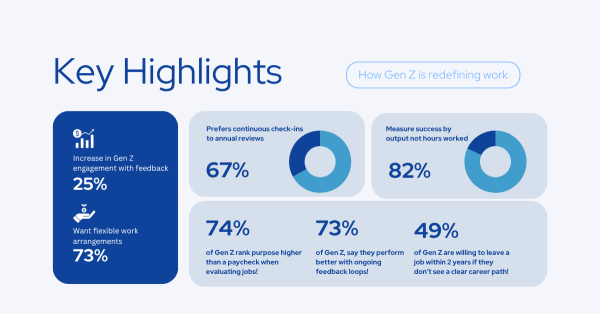In today’s rapidly evolving workplace, managing performance reviews effectively is no longer optional—it’s critical for retaining top talent and driving organizational success. With Gen Z (born between 1997 and 2012) now making up over 30% of the global workforce (World Economic Forum, 2024), traditional approaches to performance management are proving inadequate. Nearly half of this generation is already at working age, bringing with them fresh expectations shaped by digital fluency, social awareness, and a desire for rapid growth.
As an HR leader and workplace psychology expert, I’ve seen how misaligned evaluation processes can lead to disengagement, employee turnover, and lost productivity. Gen Z’s values are unique: they prioritize purpose, flexibility, mental health, and authentic growth opportunities. Unlike Baby Boomers or Millennials, who tolerated annual reviews, Gen Z expects immediacy, transparency, and continuous feedback.
This blog explores how to adapt performance evaluations for Gen Z using data-driven insights, psychological principles, and HR best practices—while showcasing how tools like OrangeHRM’s 360-degree performance management module can help organizations build a culture of high performance and engagement.
Understanding the Gen Z Psyche in the Workplace
To effectively manage Gen Z, leaders must first grasp their psychological profile.
-
Shaped by major events such as the 2008 recession, COVID-19, and climate change activism, Gen Z sees work as an extension of personal identity.
-
As digital natives, they are used to instant feedback, gamification, and data-driven decisions.
-
Psychologically, they are driven by self-determination theory, which emphasizes autonomy, competence, and relatedness as motivators.
-
Gen Z has a growth mindset (Carol Dweck) but is also prone to burnout without clarity, support, and balance.
📊 Data Insight: A McKinsey study (2024) found that 82% of Gen Z workers measure success by output, not hours worked, reflecting their efficiency-driven mentality.
Gen Z also places strong emphasis on authenticity. In performance contexts, this means they want specific, actionable feedback tied to measurable impact—not generic comments. Given their higher reported rates of anxiety and depression, well-being checks during evaluations are essential.
Data Insights: What Gen Z Wants From Performance Management

Several recent surveys highlight how Gen Z is redefining performance management:
-
Frequent feedback matters: Only 19% of Gen Z receive feedback more than once a month, yet 74% say they perform better with ongoing feedback loops (PwC, 2024).
-
Purpose over pay: 74% rank purpose higher than a paycheck when evaluating jobs (Monster.com, 2024).
-
Career growth expectations: 49% are willing to leave a job within 2 years if they don’t see a clear growth path (Deloitte Global Gen Z & Millennial Survey, 2025).
-
Flexibility is non-negotiable: 73% want flexible work arrangements, and turnover spikes 20% in companies enforcing rigid office policies (Johns Hopkins, 2024).
🔑 Standout Data Point for Leaders: Organizations using real-time, tech-enabled performance feedback report a 25% increase in Gen Z engagement (PwC, 2024).
Why Traditional Performance Evaluations Fail Gen Z
Traditional performance reviews—annual, manager-led, and backward-looking—fall short for Gen Z because they:
-
Focus on past performance rather than future growth.
-
Provide feedback too infrequently for a generation accustomed to instant communication.
-
Lack transparency, increasing perceived unfairness.
-
Rely on manager-only input, when Gen Z values peer and cross-functional feedback.
📊 Forbes (2025) notes that Gen Z finds annual reviews “disengaging and outdated,” with 67% preferring continuous check-ins instead.
Strategies for Effective Performance Evaluations with Gen Z
To engage Gen Z effectively, organizations must shift toward modern, adaptive systems.
1. Implement Continuous Feedback & 360-Degree Reviews
-
Replace annual reviews with quarterly or monthly check-ins.
-
Use 360-degree feedback to include managers, peers, and direct reports.
-
Tools like OrangeHRM’s Performance Module allow real-time tracking, instant publishing, and multi-source reviews that give Gen Z the transparency they crave.
👉 OrangeHRM’s 360-degree module makes evaluations more collaborative and equitable by balancing perspectives across teams.
2. Align Goals with Purpose and Social Impact
-
Set SMART goals tied to organizational purpose.
-
Involve Gen Z in goal-setting to give them ownership.
-
Emphasize Diversity, Equity & Inclusion (DEI) in evaluation criteria.
📊 Deloitte (2025): Only 6% of Gen Z prioritize leadership positions as a goal; instead, they want balanced, meaningful work.
3. Leverage Technology for Transparency
-
Use AI-driven platforms like OrangeHRM’s performance analytics dashboards to track progress and reduce bias.
-
Provide mobile-accessible updates so feedback is available anytime, anywhere.
4. Incorporate Mental Health and Well-Being
-
Embed stress and workload discussions in evaluations.
-
Use strength-based assessments to boost resilience.
-
Connect Gen Z to Employee Assistance Programs (EAPs) or digital well-being tools.
5. Focus on Career Development
-
Frame evaluations as roadmaps for growth, not static ratings.
-
Provide mentorship programs, rotational opportunities, and stretch assignments.
-
OrangeHRM’s module allows managers to link performance outcomes directly to development plans and learning opportunities.
6. Personalize Recognition & Rewards
-
Move beyond monetary rewards—offer personalized recognition like skill-building opportunities or public shoutouts.
-
Use social features (like Slack mentions or LinkedIn endorsements) that align with Gen Z’s digital lifestyle.
7. Use Data to Continuously Improve
-
Collect engagement metrics and feedback from Gen Z after each evaluation cycle.
-
OrangeHRM’s AI tools and analytics enable HR teams to measure what works and adapt quickly.
Case Study: Spotify’s Gen Z Performance Strategy
Spotify recognized high Gen Z attrition rates and overhauled its performance evaluations. They introduced:
-
Quarterly feedback sessions instead of annual reviews.
-
Peer-to-peer recognition platforms.
-
Hybrid work models to support flexibility.
📊 Result: Gen Z attrition dropped 50% within one year, while innovation scores rose by 30%.
This case reinforces the power of adapting evaluation processes to Gen Z expectations—something OrangeHRM’s performance management system is designed to streamline globally.
How OrangeHRM’s 360-Degree Performance Module Helps
OrangeHRM offers one of the most comprehensive and flexible performance management solutions in the market. Key features include:
-
360-Degree Feedback: Multi-source evaluations for fairness and transparency.
-
Goal & KPI Tracking: Managers and employees can align on measurable objectives.
-
Continuous Feedback: Ongoing updates replace the dreaded annual review.
-
Customizable Review Cycles: Quarterly, monthly, or project-based reviews.
-
Integration with Learning & Development: Link performance outcomes with career growth.
-
AI-Powered Assistance via Citra: Automates tasks like scheduling reviews, analyzing feedback, and surfacing insights.
For companies managing Gen Z, OrangeHRM bridges the gap between expectation and execution by making evaluations frequent, fair, transparent, and growth-focused.
Conclusion
Performance evaluations for Gen Z require more than just incremental change—they demand a fundamental shift. This generation expects continuous feedback, authenticity, and growth-oriented systems. Traditional methods not only fail to engage them but actively drive turnover.
By embracing modern tools like OrangeHRM’s 360-degree performance management module, organizations can transform evaluations from a compliance exercise into a strategic advantage—boosting engagement, retention, and innovation.
The future of performance management lies in real-time, data-driven, human-centered evaluations. For leaders, the call to action is clear: evolve your performance processes today, or risk losing the generation that will define tomorrow.
